

Why the Google Book Settlement Failed – and What Comes Next? Piling on. Since posting my comments on the Google Book Settlement earlier this week, I have followed other commentary as closely as time has allowed.
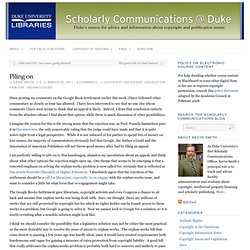
I have been interested to see that no one else whose comments I have seen seems to think that an appeal is likely. Indeed, I draw that conclusion entirely from the absolute silence I find about that option, while there is much discussion of other possibilities. HathiTrust Has Posted Their March, 2011 Activities Update « INFOdocket. Opt in for open access « Everybody's Libraries. Is It Time for the Digital Public Library of America? April 11th to 14th, 2014 - Annual Guild of One-Name Studies Conference, Ashford, Kent, United Kingdom April 19, 2014 - Tacoma-Pierce County Genealogical Society, Tacoma, Washington April 27, 2014 - Genealogical Society of Washtenaw County, Michigan May 7 to 10, 2014 - National Genealogical Society annual conference, Richmond, Virginia.
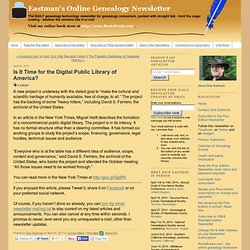
GBS at the Crossroads: What Now, What Next? One year ago last February just days before the Google Books Settlement Fairness Hearing, I wrote a blogpost fancifully titled Hurtling Toward the Finish Line: Should the Google Book Settlement Be Approved?
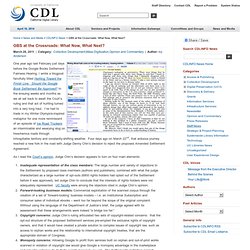
In the ensuing weeks and months as we all sat back to await the Court’s ruling and that act of hurtling turned into a very long haul, I’ve had to trade in my Winter Olympics-inspired metaphor for one more reminiscent of an episode of Ice Road Truckers: an interminable and wearying slog on treacherous roads through inhospitable territory and constantly-shifting weather. Four days ago on March 22nd, that arduous journey reached a new fork in the road with Judge Denny Chin’s decision to reject the proposed Amended Settlement Agreement.
As I read the Court’s opinion, Judge Chin’s decision appears to turn on four main elements: What path things will take next, no one yet knows. What do I think about all of this? There are two potential silver linings in a possible opt-in future. Blog: Norway as a Model for a GBS Replacement? The Director of Kopinor, Yngve Slettholm, and the National Librarian of Norway, Vigdis Moe Skarstein, sign the Bookshelf agreement.
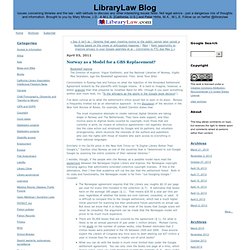
Foto: Anne Tove Ørke Commentary is flowing fast and furious on what the rejection of the Amended Settlement Agreement brokerd by the plaintiffs with Google means. It is hard to imagine, however, a better analysis than that prepared by Jonathan Band for ARL (though if you want something written with more heat, try "To the whingers go the spoils in the Google book decision"). I've been curious as to what the settlement's critics would like to seen in its place. Norway is frequently trotted out as an alternative approach. The most impressive attempts to create national digital libraries are taking shape in Norway and The Netherlands.
The Norwegian agreement requires that the Library pay roughly $0.10 per page per year for every title included in the collection (§ 7). Ruling Spurs Effort to Form Digital Public Library. Collective licensing as an answer to Google Books’ copyright case. Guideiv-final-1.pdf (Objet application/pdf) Stanford not fazed by Google Books decision. U.S.
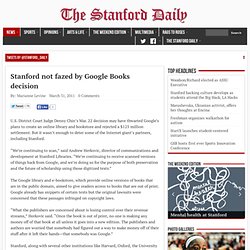
District Court Judge Denny Chin’s Mar. 22 decision may have thwarted Google’s plans to create an online library and bookstore and rejected a $125 million settlement. But it wasn’t enough to deter some of the Internet giant’s partners, including Stanford. “We’re continuing to scan,” said Andrew Herkovic, director of communications and development at Stanford Libraries.
“We’re continuing to receive scanned versions of things back from Google, and we’re doing so for the purpose of both preservation and the future of scholarship using those digitized texts.” The Google library and e-bookstore, which provide online versions of books that are in the public domain, aimed to give readers access to books that are out of print. “What the publishers are concerned about is losing control over their revenue streams,” Herkovic said. San Francisco's Alternative Online Daily News » Google Books Court Rejection Shows Copyright Litigation Is Exhausted. Time for Congress to Help Pave the Information Highway In contrast with many fellow writers, I believe Google does much more good than bad.
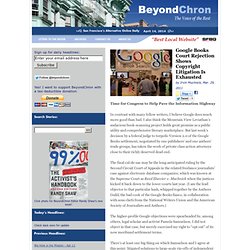
I also think the Mountain View Leviathan’s audacious book-scanning project holds great promise as a public utility and comprehensive literary marketplace. Just for once, Google has been given a bloody nose. Last week, a US judge in Manhattan made a landmark decision.
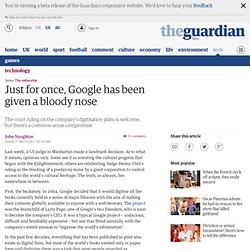
As to what it means, opinions vary. Some see it as arresting the cultural progress that began with the Enlightenment; others are celebrating Judge Denny Chin's ruling as the blocking of a predatory move by a giant corporation to control access to the world's cultural heritage. Six Reasons Google Books Failed by Robert Darnton. Judge Denny Chin’s opinion in rejecting the settlement between Google and the authors and publishers who sued it for infringement of their copyrights can be read as both as a map of wrong turns taken in the past and as an invitation to design a better route into the digital future.
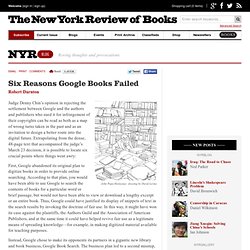
Extrapolating from the dense, 48-page text that accompanied the judge’s March 23 decision, it is possible to locate six crucial points where things went awry: First, Google abandoned its original plan to digitize books in order to provide online searching. According to that plan, you would have been able to use Google to search the contents of books for a particular word or brief passage, but would not have been able to view or download a lengthy excerpt or an entire book.
Thus, Google could have justified its display of snippets of text in the search results by invoking the doctrine of fair use. Fourth, rights held by authors and publishers located outside the United States raised similar problems. The Book Deal May Be Dead, But Google Is Still Right: Tech News and Analysis « The Google book settlement — which the search giant signed with the Authors Guild and the Association of American Publishers in 2008, after a dispute over the company’s scanning of books — was struck down by a judge this week as too far-reaching, which is arguably true (although Google would undoubtedly disagree).
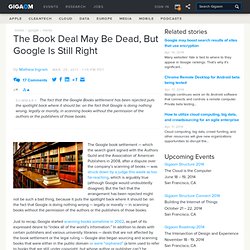
But the fact that the arrangement has been rejected might not be such a bad thing, because it puts the spotlight back where it should be: on the fact that Google is doing nothing wrong — legally or morally — in scanning books without the permission of the authors or the publishers of those books. Just to recap, Google started scanning books sometime in 2002, as part of its expressed desire to “index all of the world’s information.”
So far, so good. But Google also started scanning and indexing books that were under copyright, then offered authors and publishers the ability to “opt out” of the program and have their books removed. The Google Settlement Rejection: What Comes Next? When it was introduced in 2008, the Google Book Settlement was hailed by its creators as historic.
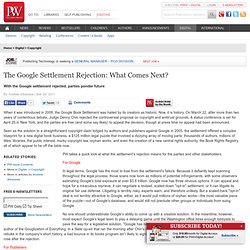
Now, it is history. On March 22, after more than two years of contentious debate, Judge Denny Chin rejected the controversial proposal on copyright and antitrust grounds. A status conference is set for April 25 in New York, and the parties are free (and some say likely) to appeal the decision, though at press time no appeal had been announced. Seen as the solution to a straightforward copyright claim lodged by authors and publishers against Google in 2005, the settlement offered a complex blueprint for a new digital book business, a $125 million legal puzzle that involved a dizzying array of moving parts: thousands of authors, millions of titles, libraries, the public interest, murky copyright law, orphan works, and even the creation of a new central rights authority, the Book Rights Registry, all of which appear to be off the table now.
Dpla-discussion - [dpla-discussion] Concept note. Syndicat national de l'édition. Rejet du projet d'accord de règlement entre Google et les auteurs et éditeurs américains par la justice américaine. - Ministère de la Culture et de la Communication. Audrey Azoulay,ministre de la culture et de la Communication, félicite chaleureusement Pierre Huyghe, qui s'est vu décerner le prestigieux Prix du Nasher Sculpture Center à Dallas.À travers ses pr...
Audrey Azoulay, ministre de la Culture et de la Communication, a présenté un budget de la Culture qui atteint 1,1 % du budget de l’Etat, marqué par un niveau de ressources jamais atteint, en hauss... Sur proposition d’Audrey Azoulay, ministre de la Culture et de la Communication, François Hollande, Président de la République, a reconduit Catherine Pégard à la présidence de l’établissement publ... Google Books : le risque de monopole écarté (Mitterrand) ActuaLitté. Google Book Search Settlement Rejected. Google’s Next Stop May Be in Congress. Google books: Creating a digital public library without Google's money - latimes.com. Say what you want about Google — whether you believe it invariably adheres to its motto "Don't be evil" or you suspect that its true goal is world domination — the firm's behavior certainly has a way of shining the spotlight on the most important technological issues in our lives.
These include secrecy, privacy and now, in connection with a huge legal fight in which a New York federal judge last week dealt Google a huge defeat, copyright law. Judge Denny Chin threw a wrench into six years of litigation by tossing out a 165-page settlement reached in 2008 between Google and authors and publishers groups. With Google Settlement Rejected, Library Groups Keep Eye on Access. The Voices of Librarians and the DPLA. Initial Statement on Decision on Amended Settlement Agreement of the Google Library Project suit. Stanford Initial Statement on Decision on Amended Settlement Agreement of the Google Library Project suit. 22 March 2011 We are disappointed by the Court’s decision today rejecting the Amended Settlement Agreement in the Google Library Project. The attraction of the project for Stanford lay in our need to preserve for long term use the contents of books (many of which are deteriorating on the shelf) and the desire to index and otherwise analyze the contents of books in order to expose more information, generate more knowledge and foster more expressions.
Such knowledge and information in turn not only drive teaching, learning and research, but also drive our economy, our political and social development, and our lives in myriad ways. We appreciate that the Court struggled with the balance between the technological tools that can permit us to harness information and the laws that can block our ability to do so. Only 5% of books created are currently in print and actively marketed. A Copyright Expert Who Spoke Up for Academic Authors Offers Insights on the Ruling - Technology. By Marc Parry Pamela Samuelson played a lead role in voicing academic authors' concerns over the Google Books settlement. That advocacy made an impact: Judge Denny Chin cited her writing in his ruling rejecting Google's deal with authors and publishers, who were represented by the Authors Guild and the Association of American Publishers.
In an interview with The Chronicle on Wednesday, Ms. Samuelson, a copyright expert and professor of law at the University of California at Berkeley, shared her take on what the judge's decision means—and where we go from here. Q. A. Thank You, Judge Chin - The Chronicle Review. By Siva Vaidhyanathan When federal Judge Denny Chin rejected the complex settlement among Google, large commercial publishers, and the elite Authors Guild this week, he may have set back Google's plans to digitize millions of books and offer them for sale online, thereby establishing monopoly control over the sale of electronic versions of the vast majority of those published in the 20th century. But Chin also generated some outstanding opportunities for the scholars and libraries to build something far better than a used bookstore.
Google might decide to scale back its ambitions for its Google Book Search program. Or it might decide to fight on for two, three, or five more years to be able to build the sort of dominant, comprehensive service it has always wanted. Regardless, we now have time to strengthen and champion the values of academe and librarianship instead of crass commercialism. The first thing that we must do is realize what is within our grasp. Judge Chin rejects AAP/Google settlement. I'll say more when I've read it, but I put a copy on the Internet Archive. After reading: The judge's decision holds no real surprises. His analysis is fully consistent with the reactions of the interested parties to the case. He rejects the settlement primarily on these grounds: It seems that a significant segment of the class of authors/publishers is not happy with the settlement. It is important to note that the position of digitization and ebooks today are vastly different than they were in 2005 when the authors and publishers first sued Google over its library digitization project.
Response to the Amended Settlement Agreement Decision. Policy Notes, Library Copyright Alliance Statement on the Google Books Decision. The Laboratorium: Inside Judge Chin's Opinion. What's next for "Google's" Book Rights Registry? Google Books: Copyright Settlement Rejected. Federal judge rejects Google book monopoly. Google.books.settlement. Www.arl.org/bm~doc/gbs-march-madness-diagram-final.pdf. Gallery: Peter Murray. L’accord Google Books n’est pas raisonnable - La Feuille - Blog LeMonde.fr. La justice américaine rejette l'accord entre Google et les éditeurs. Un juge fédéral de New York a rejeté, mardi 22 mars, l'accord conclu par Google avec des éditeurs américains. Ce dernier était destiné à régler un contentieux sur les droits d'auteur dans le cadre d'un projet de bibliothèque numérique. "Je conclus que l'accord n'est pas équitable, adéquat ou raisonnable", a déclaré le juge fédéral Denny Chin dans sa décision.
Google, le syndicat des auteurs et l'Association des éditeurs américains étaient parvenus à un accord en octobre 2008, à la suite de poursuites en justice lancées en 2005 par les auteurs et éditeurs contre la firme californienne au sujet des droits d'auteur des livres numérisés. Conformément à cet accord, Google s'est engagé à verser 125 millions de dollars pour rémunérer les auteurs dont les œuvres auraient été numérisées sans autorisation et à établir un "fonds de droits du livre" assurant un revenu aux auteurs acceptant que leurs livres soient numérisés. Auteurs, éditeurs et Google Books autour de la table ActuaLitté. Rendez-vous est à prendre le 25 avril prochain, pour la suite des événements, expliquent l'Association of American Publishers et la Guild of Authors, qui ont appris hier le rejet, par le juge Denny Chin du Règlement Google Books, concernant la bibliothèque numérique.
En effet, du côté des éditeurs, on prend acte que la décision du juge permet une autre orientation dans les discussions à avoir pour parvenir à un consensus juridique dans cette histoire, en travaillant sur l'opt-in. The Authors Guild - Scott Turow on Google Ruling. National Writers Union response to Google Book Settlement decision. Google Settlement is Rejected. Singel-Minded: To the Whingers Go the Spoils in the Google Books Decision.